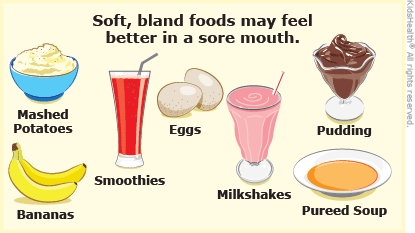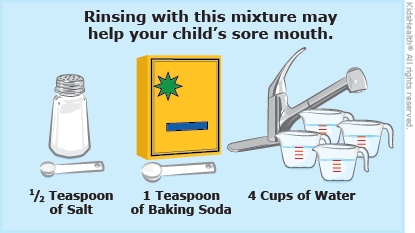Mucositis (myoo-kuh-SY-tiss) is soreness and swelling of the lining inside the mouth and sometimes the esophagus. The esophagus is the tube that connects the back of the mouth to the stomach and intestines (bowels). Mucositis is a common side effect of chemotherapy. A child with mucositis can have sores that sometimes bleed, trouble swallowing, stomach pain, and pain in the anal area, especially when having a bowel movement. They may also have diarrhea.
Medicine can help with pain and make it easier to eat and drink. Here's how to care for your child at home.

Follow your health care provider's instructions for:
- Using any prescribed mouth rinses and pain medicines.
- Whether to use acetaminophen (Tylenol® or a store brand). Some prescription pain medicines contain acetaminophen, and taking two medicines with acetaminophen could cause your child to get too much.
- Any medicines to avoid, such as ibuprofen (brand names include Motrin® and Advil®), since they may make bleeding worse.
- Using any ointments or cream in the anal area.
- Food suggestions:
- Avoid foods with hard, sharp, or dry textures (like potato chips) or that are spicy, acidic (like orange juice), or salty (like tomato sauce).
- Offer your child soft, bland foods, such as pudding, mashed potatoes, bananas, eggs, smoothies, milkshakes, and pureed soups.
- Serve food cold or at room temperature.
- Offer four or five small meals instead of three large ones.
Here are some tips to help improve mouth and throat pain:
- Use a moisturizer or balm on lips.
- Offer your child water, ice chips, or ice pops often throughout the day. Using a straw can help make swallowing liquids easier.
- If your child is old enough to rinse and spit, make a mixture of ½ teaspoon of salt, 1 teaspoon of baking soda, and 4 cups of water, and have your child rinse and spit. Have your child rinse their mouth with a little bit of this mixture 4–6 times a day. Refrigerate between uses and make a new batch every 24 hours.
- After meals, gently clean your child's teeth and mouth with a soft-bristled toothbrush, a soft, damp cloth, or a tooth sponge. You may use or skip toothpaste, depending on what is most comfortable for your child. Have your child rinse with water after cleaning.
- Skip flossing if it causes bleeding or pain.
- Do not give your child store-bought mouthwashes unless recommended by your health care provider. They may irritate your child's mouth.

You have questions or your child:
- Can't eat, drink, or swallow
- Has pain that gets worse, doesn't get better with medicine, or keeps them awake at night
- Has swelling, color changes, or white patches in the mouth
- Has bloody or black poop
- Has a fever

Can a child with mucositis have dental care?
- Certain times during cancer treatment are better than others for dental visits. Follow your health care provider's instructions on when to see the dentist.
- Your child should not wear a retainer or other removable pieces of dental equipment while on chemotherapy unless your health care provider says it's OK.





